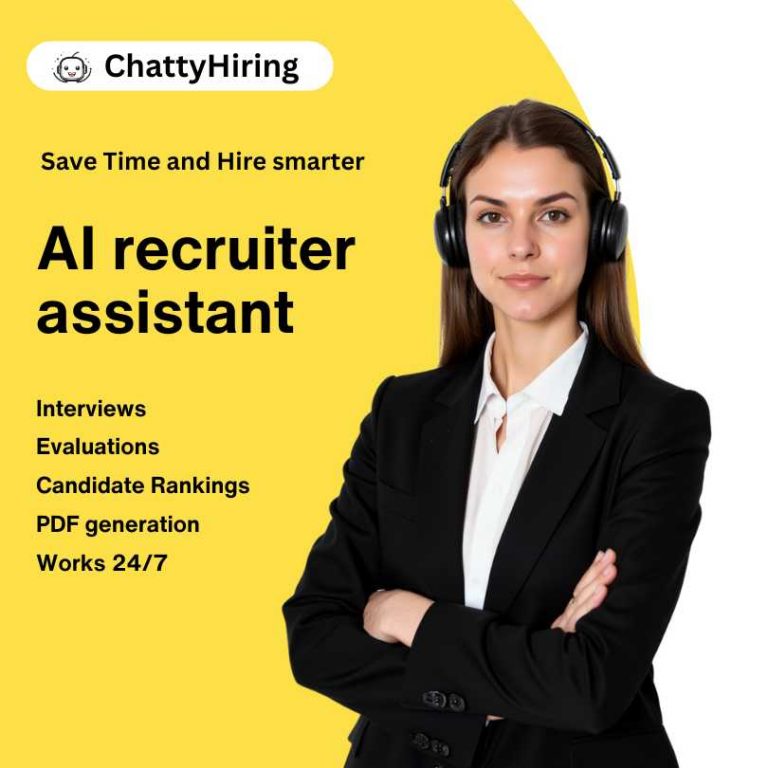How AI Helps Improve Candidate Experience in Recruitment Processes
In the world of recruitment, candidate experience is a crucial factor that directly impacts a company’s branding. Many talent teams face the challenge of providing a personalized and friendly experience for candidates to attract the best talent and, ideally, leave a positive impression on those who aren’t selected.
This challenge involves addressing some major issues of our time, including:
Lengthy Processes Over Two Weeks:
A hiring process extending beyond two weeks is a top cause of candidate dissatisfaction. During this time, candidates often lose interest or accept other offers. Slow processes also give the impression of disorganization and inefficiency on the employer’s part. Statistics show that top talent is off the market in less than 10 days.
Lack of Communication:
Many candidates receive only a generic email at the beginning of the process, followed by no updates until they may receive a “Thank you” email months later. This lack of communication generates uncertainty and frustration, leaving candidates with a negative perception of the company.
Not Listening to Candidates:
Only about 10% of applicants are interviewed for a position. Ignoring applicants based on their resume alone creates a sense of indifference from the company. Candidates want to feel heard and valued, not treated as mere numbers in a recruitment process.
Repeating Questions and Excessive Bureaucracy:
Many hiring processes require candidates to answer the same questions at different stages or in multiple forms, adding unnecessary frustration. Excessive bureaucracy can also slow the process, pushing away the most qualified candidates.
These issues are even more challenging for companies with a high volume of candidates and limited resources to attend to them individually. In an age of hyper-personalization, candidates expect attention and consideration, which many recruitment teams struggle to provide due to their workload.
How AI Can Improve Candidate Experience
Artificial intelligence has become an increasingly valuable tool to complement the work of professionals and automate processes.
The goal is to help teams perform better, not by working longer hours but by managing a heavier workload in less time.
AI is seen as a technology to complement, rather than replace, the work of professionals. This has led to the rise of “AI assistants” designed to support teams, reducing their workload while enhancing personalization and delivering an innovative candidate experience.
Interviewing Every Candidate:
A major innovation in AI is the ability to have AI interviewers conduct screening interviews with every candidate. Allowing each candidate to feel heard and to explain why they believe they’re an ideal fit can be revolutionary in the industry.
Listening to Candidates:
AI can interact with any applicant and help answer frequently asked questions, providing a fully interactive experience in the early stages of recruitment. Today’s advanced AI technologies offer communication experiences that feel more human and responsive without overloading talent teams.
Optimizing Long Processes:
Analyzing dozens of candidates simultaneously can help automate repetitive tasks in the initial stages of hiring. Currently, the average hiring time is over 30 days, but these numbers could be reduced, preventing candidates from losing interest.

Impact on Talent Professionals
The main beneficiaries are recruiters, who can focus on high-value tasks rather than being burdened with operational work. As a result, companies can improve productivity and devote more effort to employer branding by providing a positive experience for all candidates.
Startups like the Spanish company ChattyHiring are revolutionizing how companies manage their recruitment processes, especially in sectors with high application volumes. By implementing AI assistants, they enable talent teams to manage large numbers of candidates in innovative ways.
A poor candidate experience can seriously harm a company’s reputation and its ability to attract talent. However, AI is beginning to provide effective solutions to enhance every aspect of the recruitment process, from speed and communication to personalization and efficiency.
The combination of technology and empathy can transform candidate experience, making each candidate feel valued and respected, regardless of the process outcome.
-

A passionate advocate for the future of HR innovation. With expertise in leveraging AI to revolutionize recruitment processes, Carlos has a clear vision: empower HR teams while creating meaningful candidate experiences.
View all posts



